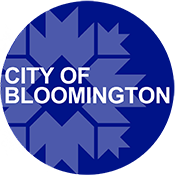
(BLOOMINGTON) – Results of a monitoring program that has tested Bloomington’s wastewater for COVID-19 since August suggest that the virus can be detected in wastewater one week earlier than a hospital experiences an escalation in cases. For ten weeks, wastewater professionals from City of Bloomington Utilities (CBU) collected samples three times each week at eight sites across Bloomington, including each of the two wastewater treatment plants. Testing of those samples was conducted by multiple private, independent laboratories in an effort to gauge viral prevalence in the community.
The initial study indicates that wastewater sampling for COVID is likely most useful for identifying hot spots, identifying community trends in conjunction with viral testing results, and monitoring for new outbreaks after a vaccine is deployed.
The capacity for advance detection of COVID-19 in wastewater allows more time for a community to react and potentially contain the spread of the virus. Wastewater testing is especially valuable in consideration of current limited access to individual testing; results will yield a more accurate prevalence rate than a positivity rate based on the number of residents who obtain tests (a figure largely defined by those who experience symptoms).
Funded by the Indiana Finance Authority (IFA), testing was coordinated by 120Water, a Zionsville-based drinking water utility technology support firm. Bloomington was one of 14 Indiana communities with college or university campuses participating in the study. Samples were analyzed by 120Water as well as a team at the University of Notre Dame led by infectious disease expert Dr. Alex Perkins and Dr. Kyle Bibby, who oversees comparative lab analysis. The final report from 120Water and data collected is available at the B-Clear open data portal, under “Utilities/Water.”
“This study demonstrates that wastewater sampling can be a valuable tool for detecting and predicting viral prevalence in our community,” said Mayor John Hamilton. “I applaud CBU’s efforts to participate in this innovative public health research, and their contribution to our abilities to grapple with the pandemic.”
After the initial ten-week study period, IFA continued the program until December 28, and CBU has continued collecting wastewater samples. At this time, IFA is considering whether to continue the program in 2021. If the IFA program is not continued, CBU plans to continue sampling at its two wastewater plants.
“As a municipal utility, we have been pleased to participate in the IFA study, and we thank our colleagues at IFA and 120water for sponsoring and supporting this important program” said Utilities Director Vic Kelson. “We hope to continue the sampling program to monitor progress as vaccines become widely available.”
To safeguard the health of CBU employees working with wastewater and collecting samples, staff wore personal protective equipment–including masks, gloves, and goggles–and followed safety standards set by regulatory entities. While disinfectants used to treat wastewater effectively kill the virus and thereby significantly minimize the risk of contamination to those interacting with wastewater, sampling can be performed because viral RNA remains detectable in wastewater even after disinfection. None of the staff working on this program have tested positive for COVID or displayed symptoms.



